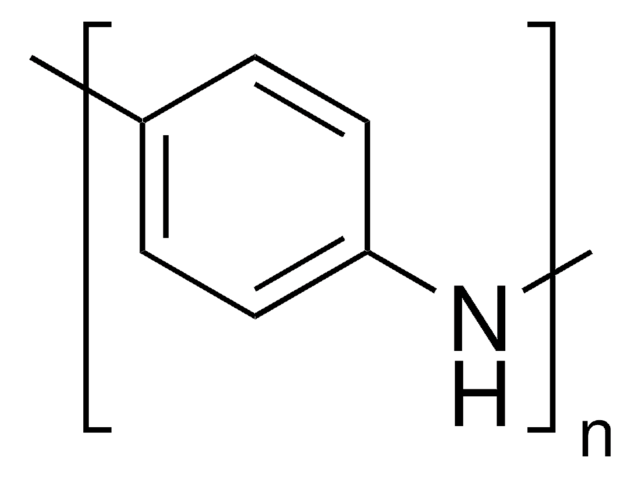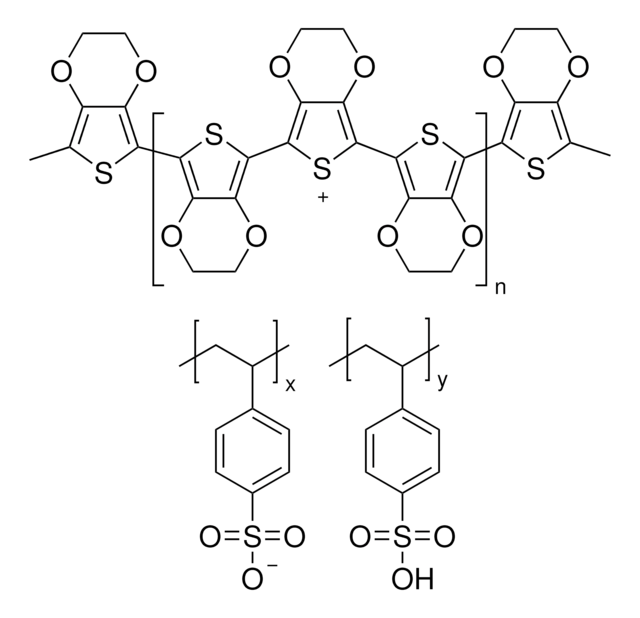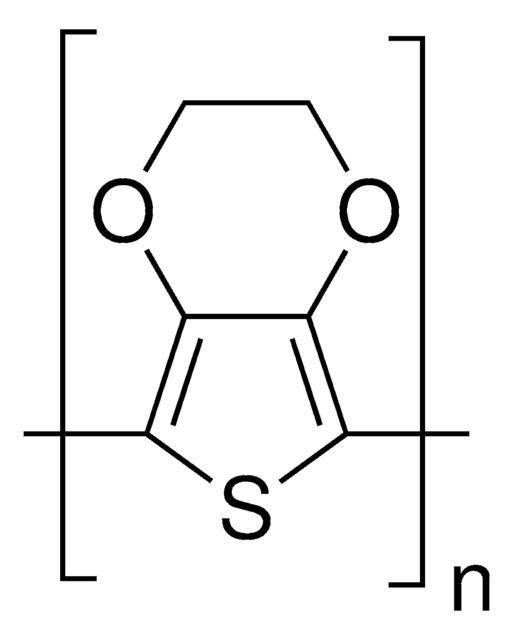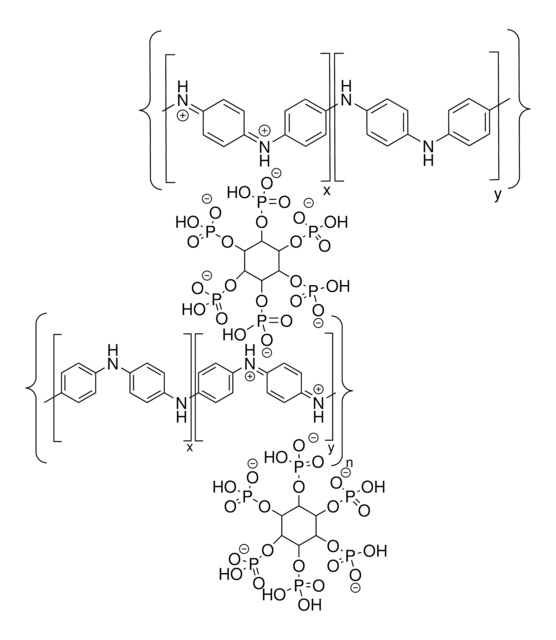428329
Polyaniline (emeraldine salt)
average Mw >15,000, powder (Infusible), 3-100 μm particle size
Sinonimo/i:
PANI
Autenticatiper visualizzare i prezzi riservati alla tua organizzazione & contrattuali
About This Item
Prodotti consigliati
Stato
powder (Infusible)
Livello qualitativo
PM
average Mw >15,000
Area superficiale
5-20 m2/g
Dimensione particelle
3-100 μm
Conducibilità
2-4 S/cm (compacted powder)
Punto di fusione
>300 °C (lit.)
Densità
1.36 g/mL at 25 °C
Densità bulk
18.8 lb/cu.ft
Cerchi prodotti simili? Visita Guida al confronto tra prodotti
Categorie correlate
Descrizione generale
Form of polyaniline complexed (doped) with proprietary organic sulfonic acid. Polyaniline is environmentally stable and with tunable conductivity.3 Synthesis of polyaniline (PANI) emeraldine salt by chemical oxidation has been reported. It was observed that sulfonated dyes chemically interact with the charged backbone of PANI. PANI selectively adsorbs the sulfonated dye. Spectral, diffraction and conductivity measurements of the polymer has been reported in the same study. 1
Inherently conductive polymer.
Stable at 100 °C and at 200 °C for short periods. Dispersed particles tend to reaggregrate in molded articles forming conductive pathways. Acidic salt of an organic acid, incompatible with most bases.
Form of polyaniline complexed (doped) with proprietary organic sulfonic acid
Stable at 100 °C and at 200 °C for short periods. Dispersed particles tend to reaggregrate in molded articles forming conductive pathways. Acidic salt of an organic acid, incompatible with most bases.
Form of polyaniline complexed (doped) with proprietary organic sulfonic acid
Applicazioni
A variety of nanomaterials like silver nanoparticles (AgNPs), graphene oxide(GO), aluminum oxide(α-Al2O3), carbon fiber and graphite can be potentially used in conjunction with PANI for the development of translational medicine, supercapacitors, triboelectric nanogenerators, and other energy storage applications.
Additive in polymer blends and liquid dispersions for electromagnetic shielding, charge dissipation, electrodes, batteries and sensors. Polyaniline may be used for linear actuator applications. 1
Confezionamento
5 g packaged in glass bottles; 25 g packaged in poly bottles
Codice della classe di stoccaggio
11 - Combustible Solids
Classe di pericolosità dell'acqua (WGK)
WGK 3
Punto d’infiammabilità (°F)
Not applicable
Punto d’infiammabilità (°C)
Not applicable
Scegli una delle versioni più recenti:
Possiedi già questo prodotto?
I documenti relativi ai prodotti acquistati recentemente sono disponibili nell’Archivio dei documenti.
I clienti hanno visto anche
Electric impulse spring-assisted contact separation mode triboelectric nanogenerator fabricated from polyaniline emeraldine salt and woven carbon fibers.
Cheedarala RK, et al.
Nano Energy, 53(43), 362-372 (2018)
Tuning electrical transport mechanism of polyaniline-graphene oxide quantum dots nanocomposites for potential electronic device applications.
Mombru? D, et al.
The Journal of Physical Chemistry C, 120(43), 25117-25123 (2016)
Andrés Felipe Cruz-Pacheco et al.
Polymers, 12(5) (2020-05-23)
Polyaniline (PANI) has recently gained great attention due to its outstanding electrical properties and ease of processability; these characteristics make it ideal for the manufacturing of polymer blends. In this study, the processing and piezoresistive characterization of polymer composites resulting
Global Trade Item Number
| SKU | GTIN |
|---|---|
| 428329-1KG | |
| 428329-25G | 4061832104850 |
| 428329-5G | 4061832104867 |
Il team dei nostri ricercatori vanta grande esperienza in tutte le aree della ricerca quali Life Science, scienza dei materiali, sintesi chimica, cromatografia, discipline analitiche, ecc..
Contatta l'Assistenza Tecnica.




